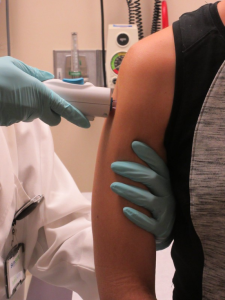Pediatric Vasculitis
Guidance for vaccination of children with vasculitis
Your child who has vasculitis may be on one or more medications that can affect the immune system (immunosuppressive medications) which make it difficult for the body to fight off infections. These medications place your child at a higher risk for infections than other children. You may already be taking steps to prevent infections, such as good handwashing, wearing a mask when around sick people, and avoiding large crowds.
We want to help you keep your child as safe as possible by protecting them against common childhood illnesses. You may not have personally seen these infections, but they still exist and continue to affect children worldwide.
One way that you can protect your child is by staying up to date on the recommended vaccines for their age group. Several organizations, including the American College of Rheumatology and the Centers for Disease Control (CDC), have developed special guidelines for vaccination in children on immunosuppressive medications.
Children on immunosuppressive medications can safely receive most vaccines indicated for their age. Studies have not shown an increased risk of disease flare or side effects with most childhood vaccines. However, the majority of physicians will hold off giving live virus vaccines to children on medications which compromise the immune system. These include the MMR (mumps, measles, rubella) and varicella (chicken pox) vaccines. Children on immunosuppressive medications should receive an annual influenza (flu) vaccine. Many children may also benefit by additional vaccinations, such as the pneumococcal vaccine to prevent severe pneumococcal pneumonias.
The timing of vaccine administration may to be adjusted so the vaccines are not given around the time of immunosuppressive medication infusions. The reason for this is to hopefully improve the body’s immune response to the vaccine.
We encourage you to discuss vaccines with your child’s primary care doctor who provides general care for your child, including vaccines, at their routine well child visits. You can also talk to your child’s specialist (rheumatologist) about their recommendations and any concerns that you may have. In addition, you can facilitate close communication between your child’s primary care provider and rheumatologist to ensure that all indicated vaccines are given in a timely manner.

VACCINE RESOURCES FOR CHILDREN WITH RHEUMATIC DISEASES
Vaccinations in Patients with Rheumatic & Musculoskeletal Disease
https://rheumatology.org/vaccinations-guideline#2022-vaccinations-guideline (rheumatology.org)
Vaccine Guidelines for Individuals with Rheumatic and Musculoskeletal Diseases
Birth-18 Years Immunization Schedule – Healthcare Providers | CDC
https://www.cdc.gov/vaccines/schedules/hcp/imz/child-adolescent.html

